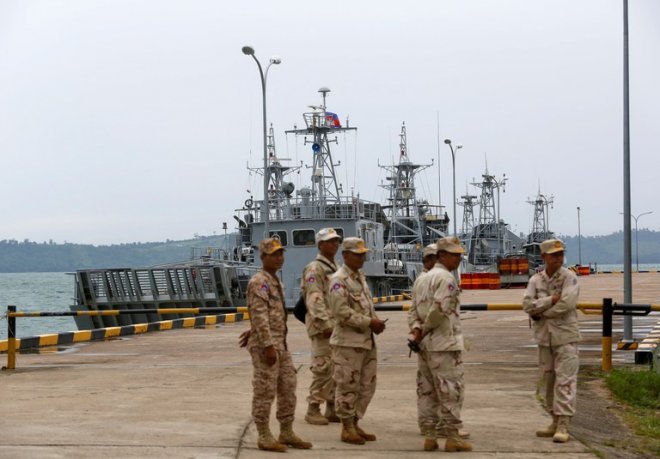US-China defense chiefs hold talks in Cambodia*
U.S. Secretary of Defense Lloyd Austin met with his Chinese counterpart, Gen. Wei Fenghe, Tuesday in the Cambodian city of Siem Reap to discuss managing the competition between the two superpowers.
The 90-minute discussion, held ahead of an ASEAN defense ministers meeting, was the second face-to-face talks between them this year. Austin and Wei met in person for the first time as defense chiefs in June at a regional security forum in Singapore.
Before the meeting, Cambodia’s Prime Minister and host Hun Sen said he hoped his country could be “a place of reconciliation” between China and the U.S.
The two sides have been seeking to open a clearer and more regular communication channel between themselves in order to avoid miscalculations and mishaps.
A press statement from the Pentagon said Secretary Austin “emphasized the need to responsibly manage competition and maintain open lines of communication” to Gen. Wei.
Austin also raised concerns about what he called “the increasingly dangerous behavior” by Chinese military aircraft in the Indo-Pacific region, reiterating that the U.S. “will continue to fly, sail, and operate wherever international law allows.”
U.S. ally Australia said a Chinese fighter aircraft dangerously intercepted an Australian military surveillance plane in the South China Sea in May, a charge denied by Beijing.
Chinese flyovers and naval patrols around Taiwan, in the East and South China Sea, are also posing challenges to the U.S. Indo-Pacific strategy.
Washington blames Beijing’s growing assertiveness and changing military postures for increased tensions in the region.
The Chinese defense ministry in its readout of the Wei-Austin meeting said: “The responsibility for the current situation in Sino-U.S. relations lies with the U.S. and not with China.”
Core interests
“China attaches great importance to the development of relations between the two countries and the two militaries, but the U.S. must respect China"s core interests,” the Chinese ministry of defense said.
A large part of the talks focused on the Taiwan issue which Beijing said “is the core of China"s core interests and the first insurmountable red line in China-U.S. relations.”
China considers Taiwan a breakaway province that shall be reunified with the mainland at any cost.
“The Chinese military has the confidence and ability to resolutely safeguard the unity of the motherland,” Wei was quoted as saying.
“No external force has the right to interfere,” he added.
For his part Austin reiterated that the U.S remains committed to its longstanding One China policy but emphasized the importance of peace and stability across the Taiwan Strait.
He underscored his opposition to unilateral changes to the status quo and called on the Chinese military to “refrain from further destabilizing actions toward Taiwan,” the Department of Defense’s statement said.
Austin and the Chinese minister also discussed other international and regional issues, the crisis in Ukraine, the South China Sea and the situation on the Korean Peninsula.
![]()
Sailors stand guard near patrol boats at the Cambodian Ream Naval Base in Sihanoukville, Cambodia, July 26, 2019. CREDIT: Reuters/Samrang Pring
The U.S. and its allies also remain worried about a security deal China signed with the Solomon Islands and its involvement in a naval facility in Cambodia, where China is building a facility its military can use, but it’s unclear whether Wei and Austin discussed these topics during their meeting.
Rong Chhun, a Cambodian political observer and union leader, told RFA Khmer that the fact the Cambodian government is getting closer to China and fails to honor its policy of neutrality as required by the constitution, especially over the Ream Naval Base, is a source of great concern.
“If Cambodian leaders don’t show a clear stance on this [Ream] issue, it will not benefit our country and Cambodian citizens,” he said.
The Association of Southeast Asia Nations Defense Ministers Meeting-Plus is an annual security forum between ASEAN defense ministers and the bloc’s eight Dialogue Partners - Australia, China, India, Japan, New Zealand, Republic of Korea, Russia and the United States.
It is hosted by the rotating chair of the ASEAN. This year’s ADMM-Plus takes place on Wednesday.
RFA Khmer contributed to this story.
 | 喜歡這篇嗎?快分享吧! |
前一頁
後一頁
 Sailors stand guard near patrol boats at the Cambodian Ream Naval Base in Sihanoukville, Cambodia, July 26, 2019. CREDIT: Reuters/Samrang Pring
Sailors stand guard near patrol boats at the Cambodian Ream Naval Base in Sihanoukville, Cambodia, July 26, 2019. CREDIT: Reuters/Samrang Pring